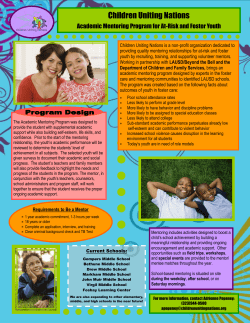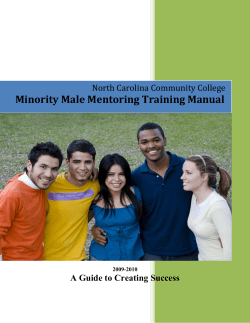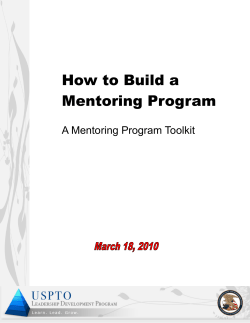
Leadership Mentoring Network Sample Partnership Agreement
1 Leadership Mentoring Network Sample Partnership Agreement ACHE has developed a model Leadership Mentoring Network (LMN) partnership agreement as an optional tool to help guide volunteer mentors and mentees (protégés) in establishing successful relationships. In this context, successful means the relationship launches, develops and leads to the achievement of stated leadership growth objectives. Often, LMN participants lack mentoring experience or they have only experienced mentoring as part of a structured program. This agreement will help them quickly and efficiently consider the key structural aspects of the relationship so they can devote most of their energy to achieving the outcomes they desire in a process they can enjoy. ACHE attempts to make entering LMN partnerships user-friendly for mentors and mentees. There is no charge to members who participate. ACHE expends staff time and effort to recruit and maintain a pool of available mentor volunteers. Participants invest hope, time and effort in their partnerships. Demand for mentors can easily exceed current supply. Consequently, offering contracts can help ensure the fulfillment of a mentor-mentee commitment. Some mentoring authorities believe entering into a partnership agreement that spells out expectations and objectives increases the likelihood of a successful mentoring relationship. Contracts/agreements can increase the prospects for a positive, successful experience by: • Investing (or supplementing) the relationship with a context that is more professional and respectful even though • o both parties enter it voluntarily, and o the contract/agreement is not legally enforceable Substituting for the external oversight available in formal, corporate mentoring programs • Clarifying that the relationship is a partnership; both must be active participants • Creating accountability and increasing the sense that “someone is depending on me” to perform 2 • Setting appropriate expectations and dealing in advance with identifiable risks • Helping to create the necessary learning atmosphere 3 Contents Tenets of the ACHE Leadership Mentoring Network…..…………………………....4 Examples of Mentoring Contracts Employed by Other Organizations……………..5 Elements of a Mentoring Contract…………………………………………………….6 Sample Leadership Mentoring Network Partnership Agreement………………......8 Sample Mentor Job Description……………………………………………………….13 Sample M entee Job Description………………………………………………………15 Model Assessment Forms……………………………………………………………...17 Mentor Self-Assessment……………………………………………………….18 Mentee Self-Assessment……………………………………………………….19 Mentoring Partnership Work in Progress Assessment……………………...20 Discussion Starters…………………………………………………………….20 4 Tenets of the ACHE Leadership Mentoring Network ACHE created the LMN to increase opportunities for mentoring as a professional development experience for its members. By design, this program helps link mentoring partners and provides resources that assist them in having effective relationships. However, once launched, the task of managing the partnership becomes the participants’ responsibility. Other key features of the LMN are: • It is virtual. Partners usually work in different organizations that are geographically separated. Face-to-face meetings are the exception. Telephone, e-mail and/or Skype/FaceTime contact is the rule. • It is voluntary. Mentors are volunteers motivated by an interest in giving back to their profession. Mentees participate in order to further their professional development. Neither partner is satisfying an employer’s objectives. • It is purpose-driven. LMN partnerships serve the general purpose of enhancing the mentee’s leadership capacity. They succeed when they address a limited number of specific leadership development needs. They are NOT formed as a means to finding a new job. • It operates through time-bounded partnerships, often lasting only six to twelve months. LMN partnerships are not intended to be lifelong relationships (although that may occur when the chemistry of a match is exceptionally favorable). The partnerships are non-exclusive, and mentors may have additional mentees. For example, as alumni of their healthcare administration programs, mentors may search for students currently enrolled in those programs to become their mentee. Mentees may have mentors that have been guides for other life domains outside their professional lives. 5 Examples of Mentoring Contracts Employed by Other Organizations One should not feel that relying on an aid such as a mentoring agreement reflects negatively on his or her capacity to be a mentor or mentee. Mentoring partnership contracts and agreements are common tools used by private industry, government, universities, and healthcare organizations. They also are in use by other professions domestically and internationally. • Healthcare examples o Health First—Melbourne, FL o U.S. Public Health Service • Other examples o Johns Hopkins University—for university staff o Intel Corporation o Newcastle University, UK—for contract research staff 6 Elements of a Mentoring Contract Partners can design a contract or agreement that covers only the major issues related to having an effective relationship, or they can delve deeply into the mechanics of mentoring interaction. Suggested content for either level of complexity is presented below, and a sample of a contract follows. Basic Elements • Names and roles of each partner • Goals for the partnership • Target length of relationship • Planned frequency of contact • Target length for planned meetings • Who primarily will initiate meetings • Method(s) of contact • Confidentiality relating to o Business/proprietary matters o Personal matters • Proposed time for and nature of review of process/results Additional Elements • Time of day for planned meetings o Only during work week or weekends? • Missed meeting appointments o Agreed upon reasons for not keeping scheduled appointment o Length of notice required if not able to keep appointment • Stance on contact outside scheduled meetings for urgent matters • Range of Mentoring Activities o Phone and e-mail o Exchange of documents o Referral to networking contacts 7 o Face-to-face meetings • Metrics for assessing satisfaction • Job descriptions for mentor and mentee 8 SAMPLE LEADERSHIP MENTORING NETWORK PARTNERSHIP AGREEMENT This model document presents provisions that are part of a mutual agreement between a mentor and a mentee. In practice, both parties would fill out identical versions of the basic document, appropriately modifying it to reflect his or her role as mentor or mentee. Ideally, both parties would receive a copy of their partner’s completed agreement form and would provide their partner a copy of their own completed agreement form. Personal Commitments I, (Mentor’s name)_, agree to participate in an ACHE Leadership Mentoring Network partnership with ( mentee‘s name) _. I am undertaking participation in mentoring activities without expectation that the relationship will provide either party with access to any specific jobs or new job-related networking contacts. My role in the partnership is to serve as (mentor or mentee). I will fulfill that role in accordance with the role description attached to this agreement. Mutual Commitments We are entering into this partnership for the following purpose(s): • Purpose one • Purpose two, if applicable • Purpose three, if applicable The proposed duration of this agreement is (number) months from (date of initial meeting). Either party may end the relationship at an earlier date for any reason by notifying the partner and the ACHE Career Resource Center. 9 We ordinarily will meet times per (week, month) or according to the following tentative schedule. This schedule may be amended at any time by agreement of both partners. Month 1 Month 2 Month 3 Month 4 Month 5 Month 6 meet meet meet meet meet meet times per (week, month) times per (week, month) times per (week, month) times per (week, month) times per (week, month) times per (week, month) Each of our meetings will not exceed number of minutes except by mutual agreement. Our meetings ordinarily may be scheduled only within the following parameters: ( ) Weekdays during regular business hours ( ) Weekdays after regular business hours ( ) Weekends at agreed time of day If in an urgent circumstance it seems necessary to request a meeting other than as regularly scheduled, notice must be given to the partner as soon as possible in advance and preferably no later than (hours, days) in advance. Such notice should explain the basis of the urgency for meeting. The partners should evaluate the appropriateness of holding the unscheduled meeting as soon as practical following resolution of the urgent matter and no later than at the partners’ next regularly scheduled meeting. In extraordinary circumstances, a partner may need to cancel an already scheduled meeting. Agreed upon reasons for cancelling a scheduled meeting include: (List reasons—to be determined by mentor and mentee) 10 If it becomes necessary to cancel a scheduled meeting one should give notification as soon as possible in advance and preferably no later than __ (hours, days) in advance. For the initial contact and first formal meeting, the mentor will be responsible for setting a meeting date and time and the agenda. Subsequently, the mentee will be responsible for setting up meetings and agendas. Contact shall be made primarily through the following media: (Check one) ( ) telephone ( ) e-mail ( ) in person All communication occurring during the mentoring partnership will remain confidential unless mutually agreed otherwise in advance of its disclosure. To avoid potential misunderstandings, both partners should be vigilant to identify as sensitive and confidential information pertaining to the proprietary interests of either party’s employer or either party’s personal and professional identity. 11 We agree to evaluate the effectiveness of our partnership using the following approach or approaches. Mentoring partners should address all three assessment dimensions below. Formal vs. Informal Assessment (Check one) ( ) informal approach based on discussions ( ) formal approach based on written evaluation forms Nature of Assessments We agree to evaluate the effectiveness of our partnership using (Check one) ( ) self-assessments ( ) mutual assessments Frequency of Assessments We agree to evaluate the effectiveness of our partnership (Check one) ( ) at the conclusion of our meetings ( ) to start a meeting by reviewing the last meeting ( ) on a (monthly, quarterly) basis ( ) at the conclusion of the partnership 12 We, the mentor and the mentee, shall both commit to full participation in this mentoring partnership for the months specified above. We agree to meet as often as detailed above to work on the purposes identified above. We will evaluate our process and results according to the schedule we have identified above. Mentor Signature Mentee Signature Date Date 13 Sample Mentor Job Description Mentoring is a process that creates change through learning about how one experiences and endures challenges that emerge as one tries to accomplish a goal. Mentors and mentees must create an atmosphere that is conducive to learning. When they succeed, their relationship will be one filled with mutual respect and trust. The relationship will afford safety so confidential and sensitive information can be shared. Risk taking is encouraged, and failures are not punished but rather are accepted as investments in learning. The relationship will be productive as evidenced by the mentee having improved knowledge, skills, or performance. KEY COMPETENCIES OF AN EFFECTIVE MENTOR The following mentor competencies summarize a presentation made by Larry Ambrose and Jeff Noblin, FACHE, during the ACHE Audio Seminar “Becoming an Effective Mentor” presented October 15, 2003. The mentor is supportive. Some associated behaviors include: -Shares and reflects on personal and professional information to build trust. -Makes self available physically and emotionally by -Honoring commitments by meeting when agreed -Listening empathically to feelings as well as facts -Is accepting and non-judgmental -Uses good timing when disagreeing is necessary -Makes appropriate reinforcing comments often and on a timely basis The mentor is challenging. Some associated behaviors include: -Sets high expectations of performance and encourages trying -Notes “safe,” old patterns of performing 14 -Distinguishes comfort zone from desired level -Confronts issues and assumptions -Plays “devil’s advocate” The mentor is a pathfinder. Some associated behaviors include: -Helps establish mentee’s succinct vision for growth -Helps identify and select among potential learning experiences -Helps “connect the dots” between activities undertaken and importance in achieving developmental goal -Shares own experiences and acts as role model The mentor is empowering. Some associated behaviors include: -Helps clarify mentee’s thinking and feeling on an issue to enable deciding what action to take -Avoids owning and solving mentee’s problem when presented to her or him -Allows mentee to fail as part of growing and learning to take responsibility The mentor manages effective learning. Some associated behaviors include: -Assists in establishing development objectives -Helps identify and evaluate relevant learning activities -Pushes for learning in depth (problem finding not just problem solving) -Identifies and challenges mentee’s reliance on old habits and approaches -Guides mentee in applying specific lessons to broader context 15 Sample M e n t o r Job Description Mentoring is a process that creates change through learning about how one experiences and endures challenges that emerge as one tries to accomplish a goal. Mentors and mentees must create an atmosphere that is conducive to learning. When they succeed, their relationship will be one filled with mutual respect and trust. The relationship will afford safety so confidential and sensitive information can be shared. Risk taking is encouraged, and failures are not punished but rather are accepted as investments in learning. The relationship will be productive as evidenced by the mentee having improved knowledge, skills, or performance. KEY COMPETENCIES OF AN EFFECTIVE MENTEE The following mentor competencies summarize a presentation made by Larry Ambrose and Jeff Noblin, FACHE, during the ACHE Audio Seminar “Becoming an Effective Mentor” presented October 15, 2003. The mentee is receptive and open to accepting help. Some associated behaviors include: -Shares and reflects on personal and professional information to build trust -Honors commitments by meeting when agreed -Requests assistance and acts on recommendations -Seeks and honors honest feedback The mentee is self-managing. Some associated behaviors include: -Assumes ownership of decisions about career direction -Takes responsibility for acting to advance toward career goals and objectives -Readily supplies the energy to propel the mentoring partnership 16 The mentee strives to achieve and be guided by authentic self-awareness. Some associated behaviors include: -Self-examines introspectively to establish strengths, weaknesses and values -Learns how own behaviors and patterns affect others -Regularly reflects on established developmental needs and how he or she responds to them The mentee maintains a growth orientation. Some associated behaviors include: -Articulates clear vision of own desired future -Develops solid agenda for advancing from present reality to desired future -Seeks lessons from developmental experiences even when not entirely successful 17 MODEL ASSESSMENT FORMS ACHE has provided three model assessment forms for mentoring partners interested in employing formal written assessments as part of their mentoring activities. Two are self-assessment forms—the Mentor Self-Assessment and the Mentee SelfAssessment. The third, the Mentoring Partnership Work in Progress Assessment, is a form that both mentor and mentee complete for the purpose of sharing and comparing feedback that assesses the progress of the relationship. The partners may decide to employ the forms according to a predetermined schedule or they may wish to wait until the relationship reaches a significant mentoring milestone such as when the mentee“solos” using a new and unfamiliar managerial approach. 18 Mentor Self-Assessment Never Meetings I made myself generally available for regularly scheduled meetings I met when scheduled I met for entire time scheduled to cover agenda If I had to cancel a meeting I gave advance notice If I had to cancel a meeting I rescheduled promptly I established guidelines for urgent contact between scheduled meetings Agendas I assisted in establishing developmental priorities for partnership I insisted on having agendas for all regularly scheduled meetings I followed agenda during the course of meetings I managed time to cover entire agenda during meeting Building and Maintaining Relationship I was open in sharing personal experiences and information I made clear my expectations concerning confidentiality I respected differences in our values and perspectives I offered reinforcement for specific accomplishments I offered critical feedback with sensitivity I was satisfied with the level of trust we achieved Development Processes My discussions were substantive not superficial I maintained continuity of discussions of our priorities I reflected on suggested solutions rather than suggesting solutions I enabled learning more than I taught I offered alternatives to achieve desired professional development Sometimes Usually Always 19 M e n t e e Self-Assessment Never Meetings I undertook scheduling meetings as my responsibility I met my mentor when scheduled I did not try to extend meetings beyond the allotted time scheduled If I had to cancel a meeting I gave advance notice If I had to cancel a meeting I rescheduled promptly I respected guidelines for urgent contact between scheduled meetings Agendas I collaborated in establishing developmental priorities for partnership I prepared agendas in advance for all regularly scheduled meetings I followed agenda topics during the course of meetings Building and Maintaining Relationship I was open in sharing personal experiences and information I made clear my expectations concerning confidentiality I respected differences in our values and perspectives I sought critical feedback I was satisfied with the level of trust we achieved I sought my partner’s opinion of the accuracy of my selfassessment Development Processes I advanced topics that were substantive not superficial I welcomed continuity of discussions about our priorities I did not resist considering developmental alternatives that were out of my comfort zone I reflected on lessons learned even from efforts that were not entirely successful Sometimes Usually Always 20 Mentoring Partnership Work in Progress Assessment Never 1. 2. 3. 4. 5. We have created sufficient trust to work well together We do not have to hide disagreements We have established clear goals for our partnership We are mutually committed to our partnership’s success We approach our partnership with businesslike professionalism 6. We include having fun in our partnership 7. We share constructive feedback with each other 8. Our discussions are more substantive than superficial 9. We are achieving an appropriate balance between mentor teaching and protégé learning 10. We devote an optimum amount of time to our partnership Discussion Starters I believe what my partner likes best about how we work together is: I believe what my partner wishes I would do more of is: I believe what my partner wishes I would do less of is: Sometimes Usually Always
© Copyright 2025





















